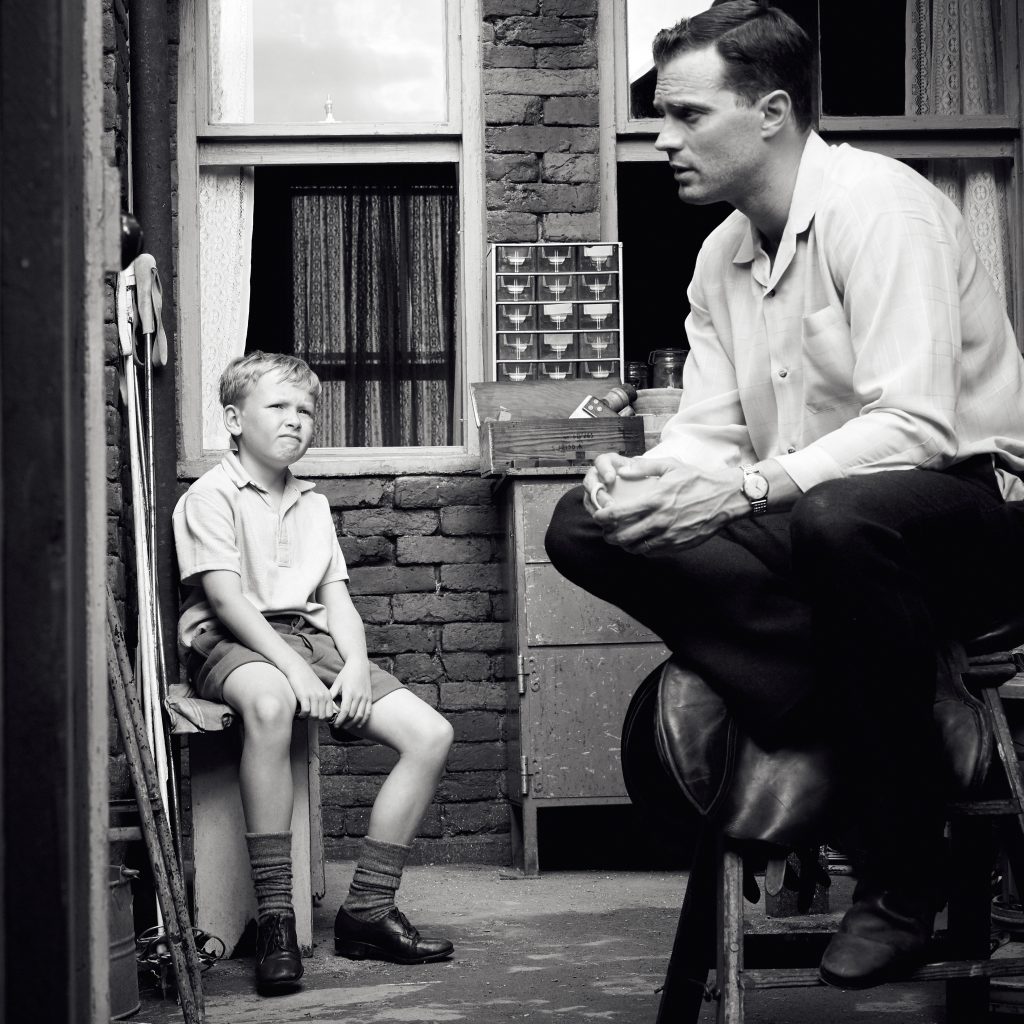‘BELFAST is the most personal film I have ever made. About a place and a people, I love.’ Kenneth Branagh
Focus Features presents Kenneth Branagh’s BELFAST. Written and directed by Academy Award® nominee Branagh, BELFAST is the humorous, tender and intensely personal story of one boy’s childhood during the tumult of the late 1960s in the city of Branagh’s birth.
BELFAST is a movie straight from Branagh’s own experience. A nine-year-old boy must chart a path towards adulthood through a world that has suddenly turned upside down. His stable and loving community and everything he thought he understood about life is changed forever but joy, laughter, music and the formative magic of the movies remain.
The cast stars Golden Globe nominee Caitríona Balfe, Academy Award® winner Judi Dench, Jamie Dornan, Ciarán Hinds, and introduces the ten-year old Jude Hill. Dornan and Balfe play a passionate working-class couple caught up in the mayhem, with Dench and Hinds as the quick-witted grandparents. The film is produced by Branagh, Laura Berwick, Becca Kovacik and Tamar Thomas.
Behind the camera are many regular Branagh collaborators including production designer Jim Clay, director of photography Haris Zambarloukos, hair and make-up artist Wakana Yoshihara, editor Úna Ní Dhonghaíle, costume designer Charlotte Walker and casting directors Lucy Bevan and Emily Brockman. The music is by Belfast-born legend, Van Morrison.
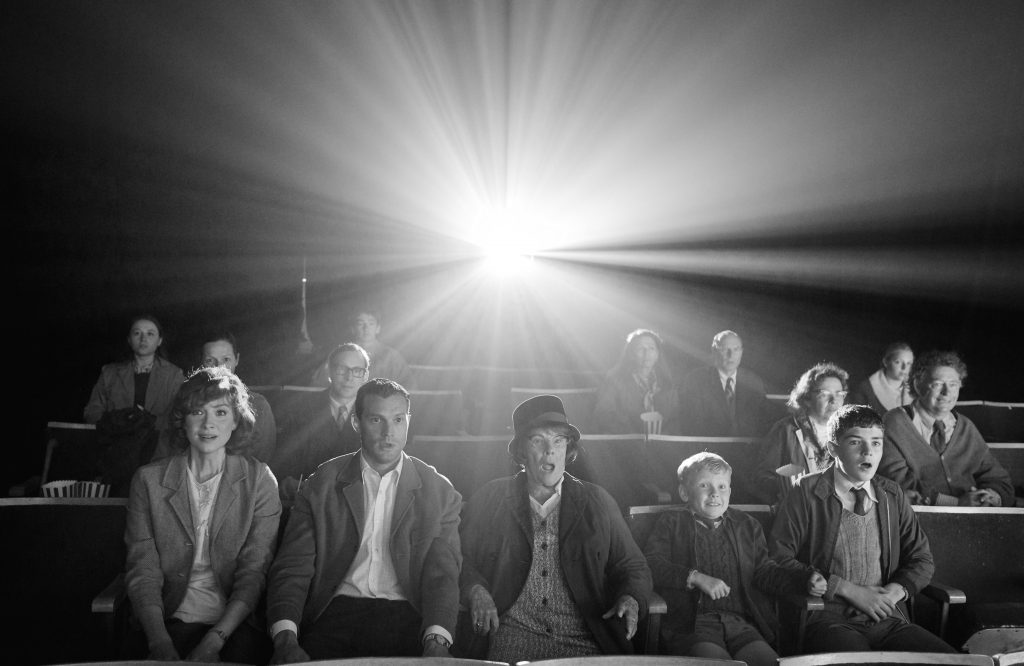
In the summer of 1969, nine-year-old Buddy knows exactly who he is and where he belongs. He’s working-class, North Belfast, happy, loved and safe. His world is a fast and funny street-life, lived large in the heart of a community that laughs together and sticks together.
Where your extended family lives in the same street and where it’s impossible to get lost because everyone in Belfast knows everyone else, or so it seems. And in every spare minute, in the darkness of movie theatres and in front of the television, American films and American TV are the transporting and intoxicating currency of Buddy’s inner life and of his dreams.
But as the 1960s stagger to a close, even as man stands on the moon itself, the dog days of August turn Buddy’s childhood dreams into a nightmare. Simmering social discontent suddenly explodes in Buddy’s own street and escalates, fast. First a masked attack, then a riot and finally a city-wide conflict, with religion fanning the flames further afield. Catholics vs Protestants, loving neighbours just a heartbeat ago, set on to be deadly foes now.
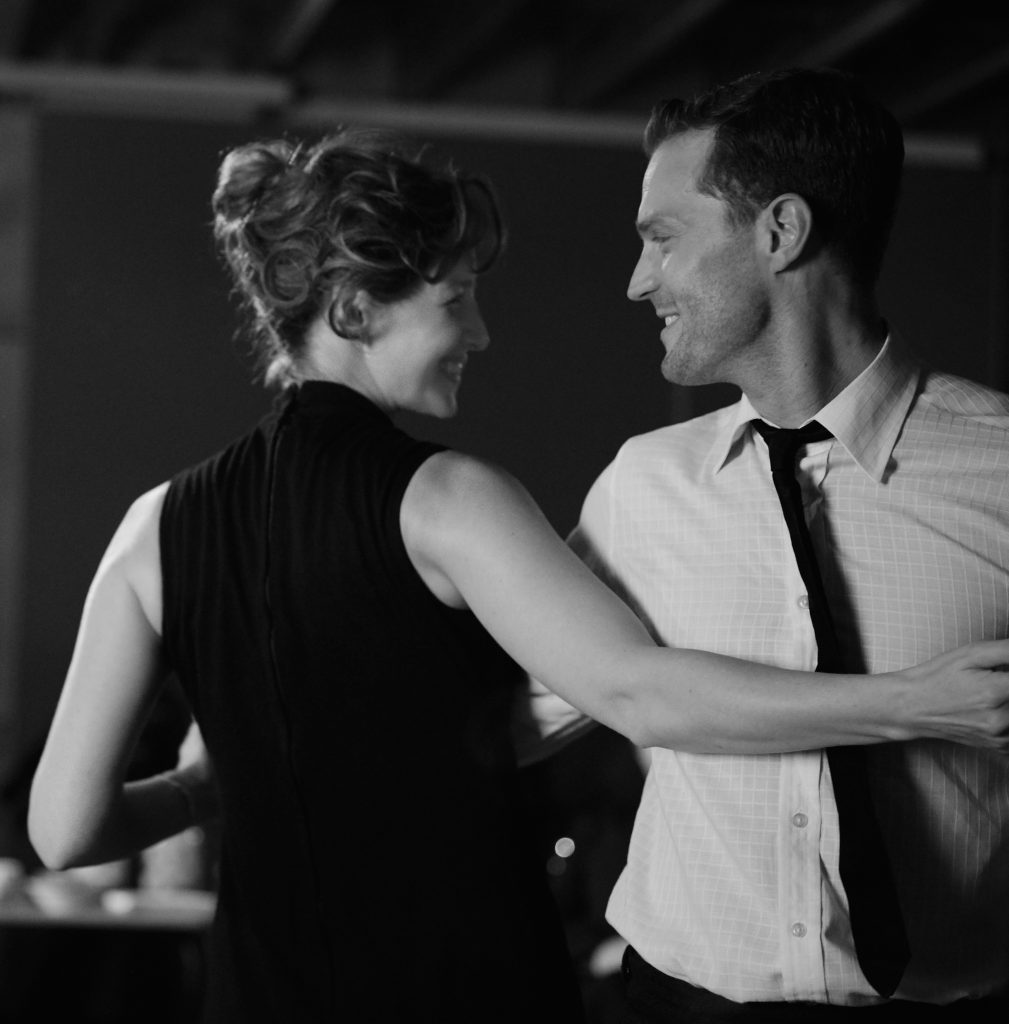
Buddy must make sense of the chaos and hysteria and of this new physical landscape of lockdown, peopled by heroes and villains, once only glimpsed on the cinema screen but now threatening to upturn everything he knows and loves as an epic struggle plays out in his own backyard.
His Ma struggles to cope while his Pa works away in England, trying to make enough money to support the family. Vigilante law rules, innocent lives are threatened. Buddy knows what to expect from his heroes – he’s spent hours in front of Westerns like High Noon and The Man Who Shot Liberty Valance – but can his father be the hero he needs him to be? Will his mother sacrifice her past in order to protect her family’s future? How can his beloved grandparents be kept safe? And how can he love the girl of his dreams?
The answers lie in Buddy’s compelling, funny, poignant and heart-breaking journey through riots, violence, the joy and despair of family relationships and the agony of first love, all accompanied by the dancing, music and laughter that only the Irish can muster when the world turns upside down.
Because what else can Buddy do? This is his only world. This is Belfast.
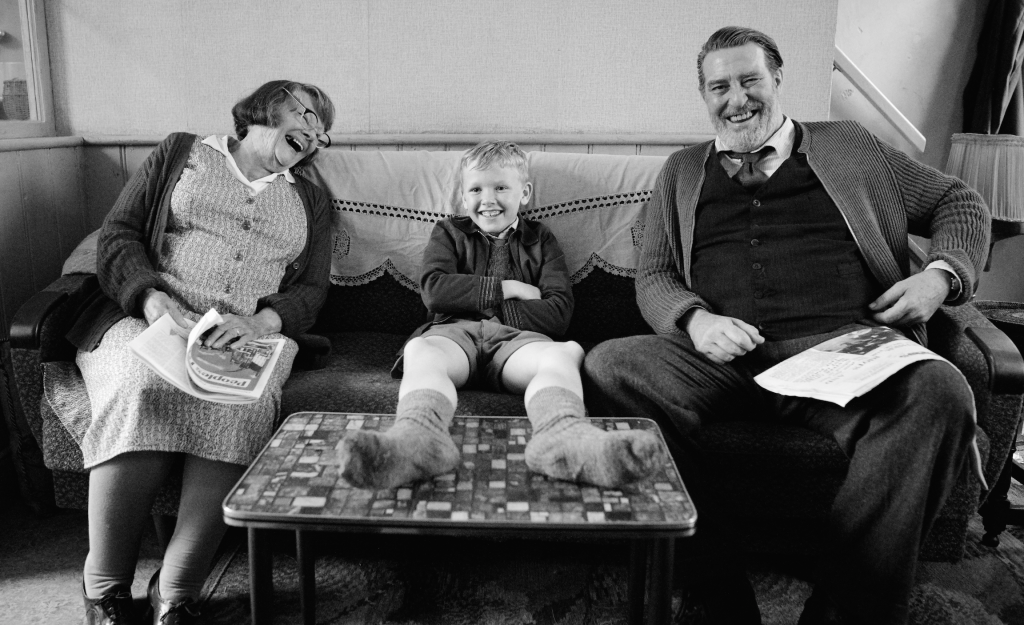
ABOUT THE PRODUCTION
‘Belfast is a city of stories,’ says Branagh ‘and in the late 1960s it went through an incredibly tumultuous period of its history, very dramatic, sometimes violent, that my family and I were caught up in. It’s taken me fifty years to find the right way to write about it, to find the tone I wanted. It can take a very long time to understand just how simple things can be and finding that perspective, years on, provides a great focus. The story of my childhood, which inspired the film, has become a story of the point in everyone’s life when the child crosses over into adulthood, where innocence is lost. That point of crossover, in Belfast in 1969, was accelerated by the tumult happening around us all. At the beginning of the film, we experience a world in transition from a kind of idyll – neighbourhood, sunshine and community – which is turned upside down by the arrival of a mob who pass through like a swarm of bees and lay waste to this piece. When they’ve gone, the street is literally ripped up by worried people who now feel they have to barricade themselves against another attack, and that is exactly how I remember it. I remember life turning on its head in one afternoon, almost in slow-motion, not understanding the sound I was hearing, and then turning round and looking at the mob at the bottom of the street and life was never, ever, ever the same again. I felt that there was something dramatic and universal in that event because people might recognise a crossover point in their own lives, albeit not always as heightened by external events.’
Branagh sat down to write the film during the first lockdown of the pandemic in 2020. ‘As the story percolated inside me, I realised that it was not only about a very recognisable small family group in a stressful situation, facing some big life choices. It was also about a different kind of lockdown, inside the barricades at the end of our street in 1969 and inside the constraints that were tightening around the family as they struggled with the decision about whether to stay or to go. So, some of the circumstances when the story is set reflected and resonated with today’s preoccupations around the pandemic – confinement and concern for the safety of yourself and your family.’
Looking for a way to describe his approach to the story, Branagh was struck by the way Pedro Almodóvar described his film Pain and Glory. ‘He called it auto-fiction. It was based on his own life but fictionalised to some degree and that’s what I’ve done here. I’ve written it very much through the eyes of a young boy, Buddy, who is a fictional version of me. He is starting to filter his experiences through exposure to a lot of films and TV and many other imagination- based encounters and stories. Those big screen images had an enormous impact on the development of my imagination and I wanted to show Buddy having those same experiences. He loves Westerns and Belfast had something of the Western town about it so at times I did feel as if I was writing a Western that was being constructed in Buddy’s mind. The films he is watching have a clear sense of good guy vs bad guy, good vs evil, and he is able to latch onto that as he looks at the bad guy who lives at the end of the street who he sees punching people and who might even have a gun. So, it’s not an accurate version of anyone’s life because it’s the version that’s playing inside Buddy’s head. Through the lens of time, 50 years on, there’s no question that what Buddy sees isn’t precisely what I saw but there’s certainly a poetic truth inside what emerges, which comes out of something authentic and which I think is the stuff of most drama. But always, the point of departure for everything in the film, is the imagination of that nine-year old boy.
I hope that audiences will be entertained by Buddy’s story. There is a certain spirit and a vitality in Belfast that I hope is reflected in the film, along with a very life-affirming humour. I hope people feel the joy and sometimes the sorrows of the city and what happens to the family and that they both recognise it and sympathise with it and understand, by looking at the reflections of other lives, to feel that we are not alone. If that’s what people get from the film, I would be thrilled.’
Once the screenplay was finished, in the spring of 2020, it moved very swiftly into production. Casting and pre-production took place in the summer and the film was one of the first to be allowed to start shooting, on locations in Northern Ireland and England. ‘We tried to find the positive aspects of filming in a pandemic,’ says Branagh ‘and one of them was that because the cast had to live in a bubble, a sense of family was very quickly engendered which was so central to what we were after. The two boys, Jude Hill (Buddy) and Lewis McAskie (Will), became like real siblings very quickly and bonded easily with the character of Moira, played by Lara McDonnell.’
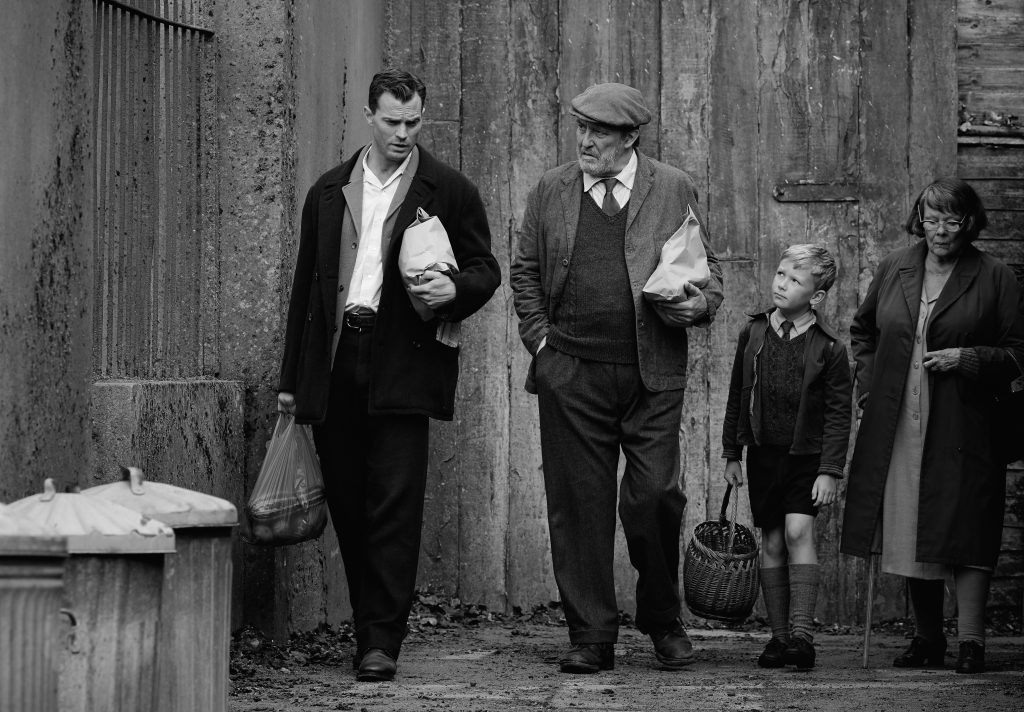
CASTING
The single most important piece of casting was of the nine-year old Buddy who appears in almost every scene and whose viewpoint and imagination lie at the very heart of the film.
‘I’ve always found something very compelling about seeing great child performers presenting that moment in life where you have to ‘put away childish things’, as the minister says in our film,’ says Branagh. ‘It happens in John Boorman’s Hope and Glory where the Blitz is the background for an accelerated childhood. Christian Bale in Spielberg’s Empire of the Sun was a breathtaking performance. Louis Malle’s Au Revoir Les Enfants is staggering in the way those kids break your heart. And you can tell that all of those films were incredibly personally important to their directors. They were stories they needed to tell, and they all had a significant influence on this one.’
Following the worldwide success of Game of Thrones, which was made in Northern Ireland, the BELFAST team found that there was a great infrastructure in place for casting. The first list of young boys to audition numbered around three hundred. Over a period of intense, socially distanced, work by the casting department, that list was whittled down to thirty and then to twelve, and then to a final shortlist with auditions taking place over Zoom until the very final choice.
‘In Jude Hill,’ says Branagh, ‘we found a boy whose talent was ready to blossom but who was still enjoying himself as an ordinary kid. Playing football was as important to him as making the film and that’s what we wanted. At the same time, he was always very serious about the work, very prepared and very open. I was asking for a curious combination – I wanted him to just be himself and I also wanted him to be able to make all the tiny performance adjustments that I was also asking for. And he really delivered. He has an extraordinary openness and is so natural in front of the camera that it was sometimes hard to believe this is his first film.’
For the adult cast, Branagh’s primary requirement was a high level of authenticity. ‘Caitríona Balfe, who plays Ma, is from Ireland but grew up near the border and has an understanding of the vernacular and of the Irish extended family life,’ he says. ‘Jamie Dornan, who plays Pa, is a real Belfast boy, from just outside Belfast. Ciarán Hinds, who
plays Buddy’s grandfather, Pop, was brought up about a mile from where I lived in Belfast.
Judi Dench has Irish blood – her mother was from Dublin – and is anyway an acting thoroughbred whose research is meticulous and who can do anything. And this group of actors also had a sense of front-footed energy that I liked, an outgoing quality that meant they became a real family very quickly.’
A film set in Belfast also provided the opportunity to work with several excellent Northern Irish actors like Colin Morgan, Turlough Convery and Conor McNeill.
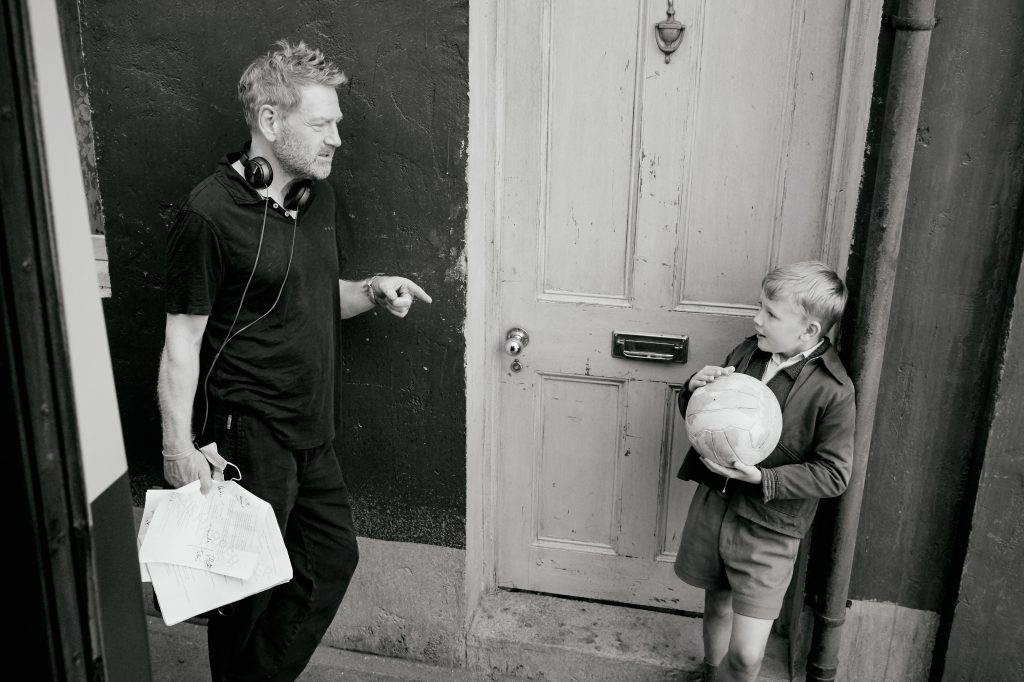
PRINCIPAL CHARACTERS
Buddy (Jude Hill) is a nine-year old boy, the younger of two brothers. He adores his parents and his grandparents and, until the start of the events in the film, lives pretty much the perfect life – playing safely in the streets where everyone knows him, collecting the toy cars his father brings him from England, watching his beloved films on TV and going to the local cinema on a regular basis with his family. He’d like it if there were a little more chocolate in his life and a little less church. He attends the local primary school where he’s near the top of the class on a regular basis. Being in the top two means he will get to sit next to the object of his desires, Catherine, the girl he’s going to marry when he’s old enough, provided he plucks up the courage to speak to her.
‘The first time I read the script I thought it was great,’ says Jude ‘and then I went and looked up everything in it I didn’t understand, like some of the Belfast slang, because I’m not from Belfast city itself, but I’ve definitely learnt a lot of it now. Buddy is like me because he has blonde hair and he loves football, even though he supports the wrong team.’ Jude is a passionate Liverpool supporter while Buddy is a Tottenham Hotspurs fan. ‘And he had a bit of a wonky childhood, being dragged into things, but he came good in the end.’
Of his experience shooting BELFAST, he says ‘It was so fun. I used to want to be a software engineer but now I’m definitely going to be an actor when I grow up.’
Ma (Caitríona Balfe) is mother to Jude and his older brother Will. She is a working-class Belfast mum, quick to laugh and quick to anger, a loving wife who is not above throwing a plate or two when her exasperation at her husband boils over, devoted to her kids and to the streets in which she has grown up and the extended network of family and friends that anchor her. She has a subtle glamour that separates her very slightly from the crowd. Within the constraints of budget and availability of fashion, she nevertheless manages to dress in a simple and casual but stylish manner.
‘She’s a wonderful and quite complex character,’ says Catríona Balfe. ‘She’s very much the master in her own domain and a force to be reckoned with in her tight-knit community. She can handle most things, but she has limitations because she struggles to see beyond this little patch she knows so well and the fact that huge changes are happening in her world makes her very fearful.’
She connected with Ma at many levels but particularly when she considered the similar position in which her own mother had found herself. ‘We lived near her family, but my father was then relocated to near the border with Northern Ireland and she was forced to move. So, the script made me think a lot about how it must have been for her when I was very young. I left Ireland when I was 18 and have never lived there again so the script resonated very deeply with me – that whole idea of reaching a point in your life when you stop and look back at your childhood and at the people and places that made you who you are. I thought it was a beautiful script and it had a very powerful effect on my memories so I can imagine how emotional a journey making this film must have been for Kenneth Branagh. Yet he has taken that experience and turned it into something that’s also filled with joy and laughter and love without losing any of the drama of the moment.’
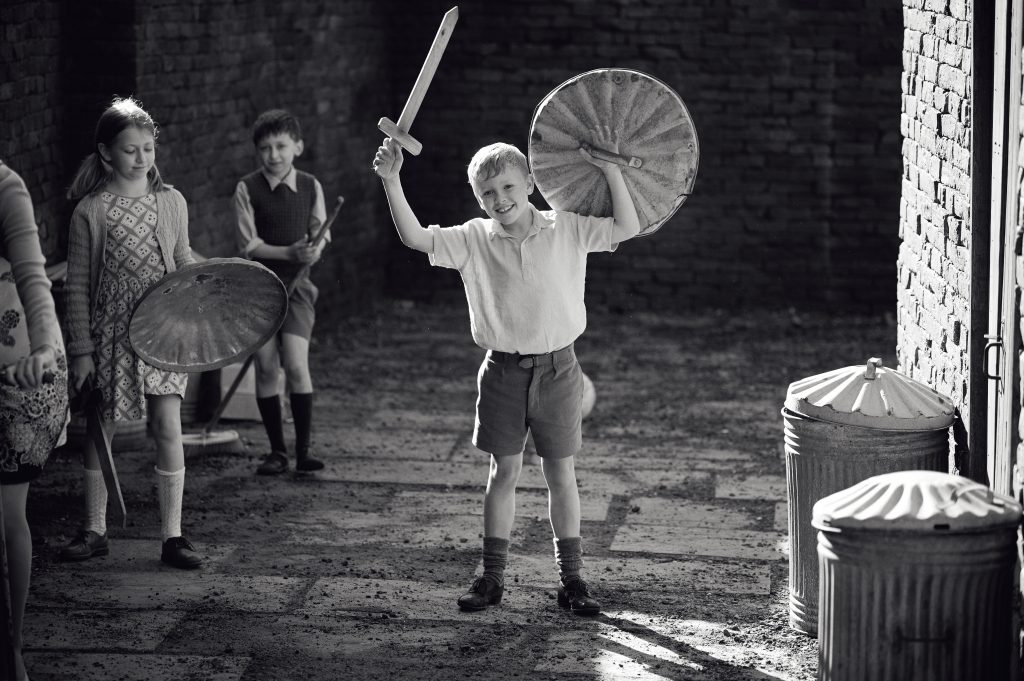
Pa (Jamie Dornan) is Buddy’s father, a joiner who has been forced to seek work in England where there are more jobs to be found and where the pay is significantly better which is helpful as he’s had a spot of bother with the taxman. He returns to Belfast every one or two weeks to his much-loved family and immediately becomes a very engaged father to his two boys, finding the time to play with them, to walk them to school or to take the family to the cinema. He is also devoted to his parents, Pop and Granny, who live close by. It is Pa who properly understands the dangers facing his young family in Belfast and his enforced absences make him fearful for their safety. He needs and wants to protect them.
‘He’s a good person, trying to do right by his family in difficult times,’ says Jamie Dornan. ‘And because I’m from the area, I know what a Belfast man is. I recognised him as soon as I read the script. In Belfast, it’s possible to live with fear but also to find the joy and the laughter in almost every situation. That’s just one of the things I’ve loved about every minute of making this film, the particular Belfast sense of humour that not only permeates the script but has also been present at every moment among the cast and crew. It’s been a joy.’
Granny (Judi Dench) is Buddy’s grandmother, Pa’s mother, and has an indispensable role in Buddy’s care and upbringing. He goes there every day from school and often unburdens himself to his grandparents about his girl problems or his worries about his parents. She dispenses sharp wisdom to counter Pop’s more romantic approach to life and is the realist and the ruler in her house and a strong and resilient woman.
‘She adores Buddy,’ says Judi Dench. ‘I have a grandson that I am very, very close to so I understand that relationship well. And what a boy Ken has found. Jude has a natural, inbuilt, sensitiveness to everything that’s happening in front of the camera and nothing seems to faze him. He’s sensational. I need to hang around to see the actor he becomes when he grows up.’
Dench is a frequent collaborator with Branagh, having appeared on stage for him and in several films he has directed. ‘It’s such fun working with Ken,’ she says. ‘I’d appear in anything he asked me to. He once sent a message from a meeting he was in, asking if he could drive round to see me to discuss a role, he wanted to offer me and I just sent back an answer saying, stay in your meeting, I’ll do it, without knowing anything more about it than that!’
For BELFAST, she recalls, Branagh came round to her house with the script. ‘My eyesight isn’t good enough to read anymore,’ she says, ‘and Ken came round and read the whole thing to me, without a break. It was obvious how much the material meant to him. Of course, I’d said yes before he read it to me and now that we’ve finished filming, I’d like to do the whole movie all over again because it’s been so wonderful.’
Pop (Ciarán Hinds) is Buddy’s grandfather, Pa’s father, a Belfast man through and through. Charming, romantic, warm, even-tempered, with a quiet, wry sense of humour, he has adored his wife since he first set eyes on her. He’s devoted to Buddy and dispenses morally dubious advice about how he should finagle his maths tests. Like his son, he worked in England as a younger man to make better money but his job as a miner has taken its toll on his lungs. He’s much loved by his family and in the community.
‘As soon as I put the costume on, it had an extraordinary effect on me,’ says Hinds. ‘The clothes were a combination of what my father would have been wearing in the nineties, but his style was dictated by what he would have been wearing in the sixties!’
Hinds grew up in Belfast, in the same streets as Kenneth Branagh, though they didn’t know each other. ‘I was Catholic,’ he says ‘and Ken was Protestant so we would never have met and I’m older than him, but the film opened up huge things in my heart about history, time and childhood. It’s such a delicate, soft, warm and funny script and it’s exactly as I remember it all, especially the warmth and the humour of people and the closeness of the community. But I also remember how suddenly the violence erupted, just like at the start of the film. I remember that a man had landed on the moon just a month before Belfast went up in flames. I think about how someone of Pop’s age would have felt when two such extraordinary events happened within a few weeks of each other.’
